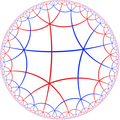Tetrahexagonal tiling
 From Wikipedia the free encyclopedia
From Wikipedia the free encyclopedia
| Tetrahexagonal tiling | |
|---|---|
 Poincaré disk model of the hyperbolic plane | |
| Type | Hyperbolic uniform tiling |
| Vertex configuration | (4.6)2 |
| Schläfli symbol | r{6,4} or rr{6,6} r(4,4,3) t0,1,2,3(∞,3,∞,3) |
| Wythoff symbol | 2 | 6 4 |
| Coxeter diagram | |
| Symmetry group | [6,4], (*642) [6,6], (*662) [(4,4,3)], (*443) [(∞,3,∞,3)], (*3232) |
| Dual | Order-6-4 quasiregular rhombic tiling |
| Properties | Vertex-transitive edge-transitive |
In geometry, the tetrahexagonal tiling is a uniform tiling of the hyperbolic plane. It has Schläfli symbol r{6,4}.
Constructions
[edit]There are for uniform constructions of this tiling, three of them as constructed by mirror removal from the [6,4] kaleidoscope. Removing the last mirror, [6,4,1+], gives [6,6], (*662). Removing the first mirror [1+,6,4], gives [(4,4,3)], (*443). Removing both mirror as [1+,6,4,1+], leaving [(3,∞,3,∞)] (*3232).
| Uniform Coloring | 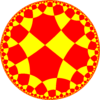 | 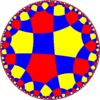 | 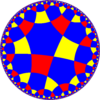 |  |
|---|---|---|---|---|
| Fundamental Domains | 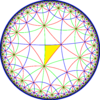 | 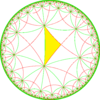 | 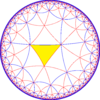 |  |
| Schläfli | r{6,4} | r{4,6}1⁄2 | r{6,4}1⁄2 | r{6,4}1⁄4 |
| Symmetry | [6,4] (*642) | [6,6] = [6,4,1+] (*662) | [(4,4,3)] = [1+,6,4] (*443) | [(∞,3,∞,3)] = [1+,6,4,1+] (*3232) |
| Symbol | r{6,4} | rr{6,6} | r(4,3,4) | t0,1,2,3(∞,3,∞,3) |
| Coxeter diagram |
Symmetry
[edit]The dual tiling, called a rhombic tetrahexagonal tiling, with face configuration V4.6.4.6, and represents the fundamental domains of a quadrilateral kaleidoscope, orbifold (*3232), shown here in two different centered views. Adding a 2-fold rotation point in the center of each rhombi represents a (2*32) orbifold.
Related polyhedra and tiling
[edit]| *n42 symmetry mutations of quasiregular tilings: (4.n)2 | ||||||||
|---|---|---|---|---|---|---|---|---|
| Symmetry *4n2 [n,4] | Spherical | Euclidean | Compact hyperbolic | Paracompact | Noncompact | |||
| *342 [3,4] | *442 [4,4] | *542 [5,4] | *642 [6,4] | *742 [7,4] | *842 [8,4]... | *∞42 [∞,4] | [ni,4] | |
| Figures |  |  |  |  |  |  |  | |
| Config. | (4.3)2 | (4.4)2 | (4.5)2 | (4.6)2 | (4.7)2 | (4.8)2 | (4.∞)2 | (4.ni)2 |
| Symmetry mutation of quasiregular tilings: 6.n.6.n | |||||||||||
|---|---|---|---|---|---|---|---|---|---|---|---|
| Symmetry *6n2 [n,6] | Euclidean | Compact hyperbolic | Paracompact | Noncompact | |||||||
| *632 [3,6] | *642 [4,6] | *652 [5,6] | *662 [6,6] | *762 [7,6] | *862 [8,6]... | *∞62 [∞,6] | [iπ/λ,6] | ||||
| Quasiregular figures configuration |  6.3.6.3 |  6.4.6.4 |  6.5.6.5 |  6.6.6.6 |  6.7.6.7 |  6.8.6.8 |  6.∞.6.∞ | 6.∞.6.∞ | |||
| Dual figures | |||||||||||
| Rhombic figures configuration |  V6.3.6.3 |  V6.4.6.4 |  V6.5.6.5 |  V6.6.6.6 | V6.7.6.7 |  V6.8.6.8 |  V6.∞.6.∞ | ||||
| Uniform tetrahexagonal tilings | |||||||||||
|---|---|---|---|---|---|---|---|---|---|---|---|
| Symmetry: [6,4], (*642) (with [6,6] (*662), [(4,3,3)] (*443) , [∞,3,∞] (*3222) index 2 subsymmetries) (And [(∞,3,∞,3)] (*3232) index 4 subsymmetry) | |||||||||||
= = = | = | = = = | = | = = = | = | ||||||
 |  |  |  |  |  |  | |||||
| {6,4} | t{6,4} | r{6,4} | t{4,6} | {4,6} | rr{6,4} | tr{6,4} | |||||
| Uniform duals | |||||||||||
 |  |  |  |  |  |  | |||||
| V64 | V4.12.12 | V(4.6)2 | V6.8.8 | V46 | V4.4.4.6 | V4.8.12 | |||||
| Alternations | |||||||||||
| [1+,6,4] (*443) | [6+,4] (6*2) | [6,1+,4] (*3222) | [6,4+] (4*3) | [6,4,1+] (*662) | [(6,4,2+)] (2*32) | [6,4]+ (642) | |||||
= | = | = | = | = | = | ||||||
 |  |  |  |  |  |  | |||||
| h{6,4} | s{6,4} | hr{6,4} | s{4,6} | h{4,6} | hrr{6,4} | sr{6,4} | |||||
| Uniform hexahexagonal tilings | ||||||
|---|---|---|---|---|---|---|
| Symmetry: [6,6], (*662) | ||||||
= | = | = | = | = | = | = |
 |  |  |  |  |  |  |
| {6,6} = h{4,6} | t{6,6} = h2{4,6} | r{6,6} {6,4} | t{6,6} = h2{4,6} | {6,6} = h{4,6} | rr{6,6} r{6,4} | tr{6,6} t{6,4} |
| Uniform duals | ||||||
 |  |  |  |  |  |  |
| V66 | V6.12.12 | V6.6.6.6 | V6.12.12 | V66 | V4.6.4.6 | V4.12.12 |
| Alternations | ||||||
| [1+,6,6] (*663) | [6+,6] (6*3) | [6,1+,6] (*3232) | [6,6+] (6*3) | [6,6,1+] (*663) | [(6,6,2+)] (2*33) | [6,6]+ (662) |
 |  |  |  |  | ||
| h{6,6} | s{6,6} | hr{6,6} | s{6,6} | h{6,6} | hrr{6,6} | sr{6,6} |
| Uniform (4,4,3) tilings | ||||||||||
|---|---|---|---|---|---|---|---|---|---|---|
| Symmetry: [(4,4,3)] (*443) | [(4,4,3)]+ (443) | [(4,4,3+)] (3*22) | [(4,1+,4,3)] (*3232) | |||||||
 |  |  |  |  |  |  |  |  |  |  |
| h{6,4} t0(4,4,3) | h2{6,4} t0,1(4,4,3) | {4,6}1/2 t1(4,4,3) | h2{6,4} t1,2(4,4,3) | h{6,4} t2(4,4,3) | r{6,4}1/2 t0,2(4,4,3) | t{4,6}1/2 t0,1,2(4,4,3) | s{4,6}1/2 s(4,4,3) | hr{4,6}1/2 hr(4,3,4) | h{4,6}1/2 h(4,3,4) | q{4,6} h1(4,3,4) |
| Uniform duals | ||||||||||
 |  |  |  | |||||||
| V(3.4)4 | V3.8.4.8 | V(4.4)3 | V3.8.4.8 | V(3.4)4 | V4.6.4.6 | V6.8.8 | V3.3.3.4.3.4 | V(4.4.3)2 | V66 | V4.3.4.6.6 |
| Similar H2 tilings in *3232 symmetry | ||||||||
|---|---|---|---|---|---|---|---|---|
| Coxeter diagrams | ||||||||
| Vertex figure | 66 | (3.4.3.4)2 | 3.4.6.6.4 | 6.4.6.4 | ||||
| Image |  |  |  |  | ||||
| Dual |  |  | ||||||
See also
[edit]References
[edit]- John H. Conway, Heidi Burgiel, Chaim Goodman-Strauss, The Symmetries of Things 2008, ISBN 978-1-56881-220-5 (Chapter 19, The Hyperbolic Archimedean Tessellations)
- "Chapter 10: Regular honeycombs in hyperbolic space". The Beauty of Geometry: Twelve Essays. Dover Publications. 1999. ISBN 0-486-40919-8. LCCN 99035678.




